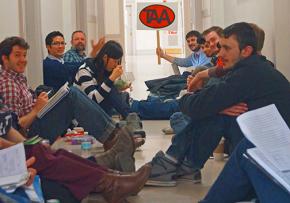Grading in to demand respect
The May Day action organized by UW graduate employees built bridges between campus workers and activists, reports .
FOR SIX hours on May 1, administrators at the University of Wisconsin-Madison (UW) had to pick their way through a maze of dozens of graduate workers and their allies sprawled across the floor as they graded papers, met with panicked undergraduates and made other preparations for finals week.
The graduate employees brought the daily work they perform to keep the university running out of stuffy apartments and hushed libraries and right to Bascom Hall, the campus building that houses the bureaucrats who continue to deny fair pay to graduate employees.
The Teaching Assistants' Association (TAA), the oldest graduate employees union in the country, organized the protest--called a "grade-in" instead of a "sit-in"--as part of its "Pay Us Back" campaign. After the 2013 grade-in, the TAA won a 4.67 percent raise, the first raise for graduate employees in four years.
Since passage of Gov. Scott Walker's Act 10, the infamous anti-collective bargaining law that led to the Wisconsin Capitol occupation in 2011, unions have struggled to find ways to negotiate with their employers, but these graduate students have been successfully challenging their unjust conditions.

It's not just a matter of the hourly wages of graduate employees, because most work hours--many of which are spent answering emails from students, preparing lesson plans or doing research--aren't counted. These hours add up and detract from the graduate workers' own educational progress.
Take-home pay for graduate students at UW has decreased more than 15 percent in the last decade, and TAA members have expanded their demands to include "annual cost-of-living adjustments, pegging wages to future fee increases, and a formal negotiating structure that explicitly recognizes the TAA as the union representing graduate workers on campus."
DURING THE six-hour protest, more than 100 graduate workers came to show their bosses just what it is that they do--and they weren't alone. Other university workers from the American Federation of State, County and Municipal Employees (AFSCME) attended, as did undergraduates from the Student Labor Action Coalition (SLAC), the Fossil Free UW coalition, Students for Justice in Palestine (SJP) and the International Socialist Organization (ISO).
This grade-in was more than just a demonstration of the work that graduate students do; it became a hub for campus activists to check in with each other on a busy May Day. There were conversations on all sides about what strategic direction different campaigns should be taking, how to support each other through the summer months, and how to build the campus left through coordinated recruitment drives. Solidarity was in the air.
"I didn't think I would have time to stop by today," said Joe Evica, an undergraduate and an ISO member, as he mentally reviewed the time he needed to prepare for finals. "But I'm really glad that I did. There were a lot of other activists here who I don't normally get to see because we're all so busy, but I just got to talk with people from all these different organizations at once, and we were able to discuss our different goals...It was the kind of discussion we rarely find time for, and we got to be a thorn in the side of the administration while we were doing it."
This event also helped to bring together students and graduate workers from different departments who rarely get a chance to interact with one another, according to a masters student in social work. "It's hard to build inter-departmental solidarity when some of us are so isolated," she said. "Having everyone together today made me feel really powerful, because there are a lot of us working on this campus and on this campaign."
As final exams draw closer and undergraduates flood the libraries, graduate assistants, who also have their own exams and projects to prepare for, will be working dozens of additional hours. And this year the administration can't ignore them.


